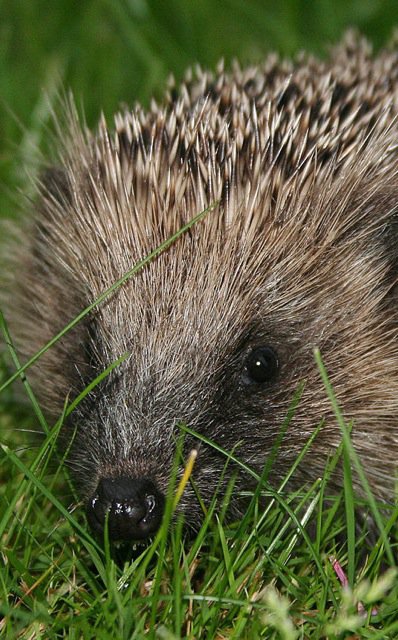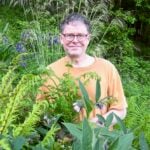In the early decades of the 21st century, flooding was still an extreme event. Now it’s the ‘new normal’ – and we’re watching our plots go under.
‘It’s Christmas Day, Noah, and it’s your birthday. I don’t think there’s much more we can do down there. You know it rains like this every Christmas.’
Noah sniffed the vase of daffodils and snowdrops, which he’d been picking since the middle of December. ‘It didn’t rain when I was five, Dad. We even had snow, remember? Come on, Dad, please? It won’t take long. I want to check the hogs are all right. Ellie’s been on walkabout with it being so warm.’ Noah sidled toward the porch and stood next to their wellies, lined up on the already sodden doormat. Rain lashed against the outside door.
 ‘That was a one-off, Noah; the floods have come every Christmas since. We’ll be soaked again – like every other day this week.’ His dad smiled and gave him a wink. ‘I knew we shouldn’t have called you Noah.’
‘That was a one-off, Noah; the floods have come every Christmas since. We’ll be soaked again – like every other day this week.’ His dad smiled and gave him a wink. ‘I knew we shouldn’t have called you Noah.’
Eyebrows raised, eyeballs rolling, the boy reached for his wellies. ‘I’ll just wear my shorts and t-shirt, it’s too hot for anything else.’
‘You need your waterproof at least, and I’m not going out in shorts on Christmas Day, whether it feels like spring or not.’ Oh for a dry and sunny winter’s day, he thought, suddenly melancholic at this longing for long-gone frost. The ‘new normal’, they called it: a whole generation growing up in winters way above zero. ‘I’m dreaming of a dry Christmas, with every sandbag I fill,’ was now the nation’s tongue-in-cheek but pleading anthem. He caught himself almost humming it.
‘You’ll get really sweaty and icky, Dad.’
‘Go tell Mum we’ll be back for dinner, then let’s go. Is your phone charged?’
Everything was cowed by weeks of endless rain: the mixed-up daffodils blooming on the roundabouts, muddied hawthorn blossom, damp blackbirds pecking listlessly at holly berries – and now Noah and his dad as they splashed their way down along the streaming, litter-strewn streets. Noah’s wellies soon began to squelch.
‘Look – they’ve never put the door dams up at Cassie’s house before. It’s pretty bad, isn’t it, Dad?’
‘Let’s keep moving, Noah, or we’ll never get to pull a cracker today.’ A manhole cover rattled and heaved as angry water pulsed from below.
Despite the rain, they heard the shouts, revving engines and spinning wheels before they reached the gate to the allotment field. A yellow-clad figure pushing a squeaking wheelbarrow up the track toward them stopped, curling back the brim of her battered sou’wester. It was Chicken Karen.
‘It’s bad down there, never come up this high before in all my 50 years. I’m getting these girls home.’ Karen pushed the plastic sheet back down over the cluck-filled cage. ‘Old George is still down there trying to save his potting compost. The old fool’s up to his knees already.’ Spray flew as she shook her head. ‘You wouldn’t believe what’s floating out of that shed of his,’ she winked. ‘He’ll poison half the town’s wildlife at this rate.’ If Old George’s shed is flooded, thought Noah, then their plot would be, too. He tugged a dripping sleeve. ‘Dad, come on.’
‘Go carefully, Karen,’ his dad said. ‘We’d better do an AllotCon later and see what’s what. I’ll mail around when… if we ever get home today.’ Noah lifted the rain-pattered plastic. ‘Merry Christmas, girls!’
Further on, Big Dennis’s four-wheel drive was in action among the pop-up torrents now criss-crossing the puddled plots, towing a mud-sunken car from one of them. Blue pellets and their hungry, drowning diners hurtled along brown, rain-gouged ruts, as soil, improved by generations who had enjoyed calmer times, raced away. The lower parts of the sloping field of rectangular plots, sheds and cobbled-together greenhouses were disappearing under muddy, roiling waters. In the distance, blue and yellow lights strobed against the walls of buildings in the town centre.
‘Look dad – the tunnel!’ They sploshed their way down the disintegrating track, pebbles dashed against their shins by angry streamlets. Their polytunnel ran down the slope, its far door now a boy’s wellie deep in water. Its year-round protection gave them at least a chance – given the new normal – of growing some decent crops. ‘I never… imagined this,’ said Noah’s dad, rubbing salted raindrops from his face. They both stood still, spellbound by the pitter-patter of rain on flood, and the polytunnel’s thunderous drumming.
‘Blast it!’ A cry from the brown wooden shed on the neighbouring plot broke the spell. Old George could be heard thrashing around inside. As he emerged, now thigh-deep in water and cradling a bag of ‘Nature’s Finest: 100% Peat Compost’, luminous yellow and green bottles swirled and bobbed out of the shed ahead of him. ‘Dammit!’ So that’s what the old devil’s been hoarding, thought Noah’s dad, realising that he hadn’t been imagining those early-morning whiffs of long-banned bug-killers last summer.
 ‘I’d better give him a hand, Noah – we can’t have that stuff floating away. The tunnel will be fine – we’re a long way from the river so we won’t get strong currents here. Why don’t you go and check on the hogs? Be careful.’
‘I’d better give him a hand, Noah – we can’t have that stuff floating away. The tunnel will be fine – we’re a long way from the river so we won’t get strong currents here. Why don’t you go and check on the hogs? Be careful.’
Noah squelched off toward the wild area, which he helped look after. Because of the floods, no one wanted to take on the low-lying allotments, so over time nature had nabbed them back. It always flooded a little down there, near the pond, but never like this. One of the blackthorns, already in flower, exploded with commotion as a magpie jabbed at a vole seeking refuge among its beak-defying thorns. Some fleece snagged around the bush like a dirty garland.
Higher up, away from the rising water, Noah wiped his phone’s waterproof sleeve clear and tapped the scanner app. There were seven tagged hedgehogs on the allotment field, and Noah’s phone could locate and identify each one. Since they’d become all but extinct on farmland, and their numbers had kept dropping, even in gardens – not least because of extreme annual flooding – the hogs had been declared an EXTIM species (Extinction Imminent), and were now showered with legal protection (which helped fend off developers coveting allotment land). Tagging helped research into why their numbers were still plummeting, and a national database showed where each hog was at any time.
The other six were quickly located, but Ellie clearly wasn’t keen on being the seventh reassuring beep. ‘Come on Ellie, where are you?’ Noah swept his phone over the most likely spots again, where the hog-watchers had built waterproof nest sites. These were filled with dry leaves and grass in autumn, before the rains arrived. High winter temperatures meant the hogs rarely hibernated like they used to. They needed extra feeding through the ‘winter’, or they’d starve, so the hog-watchers ran a nightly feeding run to keep them going. Noah looked down at the water, now dotted with plastic flowerpots and labels. Ellie had a habit of roaming further than the other hogs at this time of year, but she wasn’t stupid.
Widening his scan, Noah headed for the old hollowed-out willow near the field’s boundary. It had blown down weeks ago, but it had been too wet to do anything with it. The phone half-beeped. ‘Aha.’ At the base of the old tree – which had fallen so that its dry, hollow heart was protected from the deluge – it beeped loud and clear.
‘So that’s where you are, Ellie. Clever hog.’
Text and image © John Walker. Hedgehog image: Gaudete/Wikipedia
Find John on Twitter @earthFgardener










